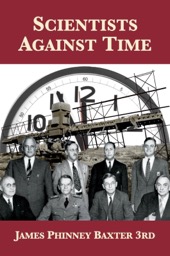 $9.99 on Kindle, Nook, Apple Books, Kobo, Google Play
$9.99 on Kindle, Nook, Apple Books, Kobo, Google Play(cover by Susan Erony)
Scientists Against Time by James Phinney Baxter III (182,000 words, 74 illustrations)
Winner of the 1947 Pulitzer prize in History.
“Mr. Baxter’s history of the OSRD is a fine book, obviously one of the most important documents written so far about the war. The author has a reticent clear style admirably suited to pin down his refractory material... His preoccupation with technical detail has not diminished his grasp of wartime science as a whole.” — E. B. Garside, The New York Times
“[A] readable mixture of history and science... This volume covers the whole span of scientific development, radar and radar countermeasures, loran, proximity fuses, the Dukw and Weasel, incendiaries and flame throwers, military medicine, including discussion of high altitude effects, penicillin and insecticides, and finally the Manhattan project and the atomic bomb... This official history of OSRD should be required reading for admirals, generals, and all officers who ever expect some day to exist in the rarefied atmosphere of high level military and naval planning. This volume is the triumphant battle-cry of American men of science returning with their shields.” — Earl W. Thompson, Proceedings of the US Naval Institute
“This is the official history of the remarkable achievements of the Office of Scientific Research and Development during World War II, by the President of Williams College.” — Robert Gale Woolbert, Foreign Affairs
“[An] admirable book.” — Richard E. Danielson, The Atlantic
“Here is one of the most significant books of World War II. It is, as Dr. Vannevar Bush says in a foreword, ‘the brief official history of the Office of Scientific Research and Development. It is the history of a rapid transition, from warfare as it has been waged for thousands of years by the direct clash of hordes of men, to a new type of warfare in which science becomes applied to destruction on a wholesale basis. It marks, therefore, a turning point in the broad history of civilization.’... The reader is constantly impressed by the valuable results obtained by the pooling of the work of British, Canadian, and American scientists... Throughout the entire book, one idea seems to stand out above all others, namely, that free men, working as a team, can outperform all the efforts of those who are driven by bureaucratic decrees.” — John W. Oliver, The American Historical Review
“This is a book for which American scientists have been waiting... it presents a clear, detailed, and yet stylistically most attractive account of the victory made possible by the civilian scientific research effort of our Nation during World War II... It will be difficult for anyone to read this book and not become an advocate of a strong, federally supported science organization to continue the research necessary for our future military preparedness and for the solution of basic peacetime problems as well.” — Leonard Carmichael, Science



